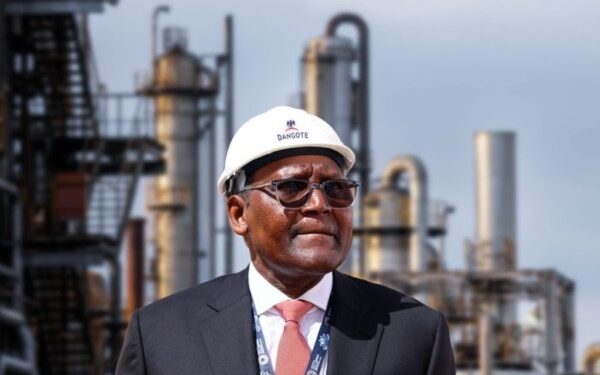Aliko Dangote, the President of Dangote Group, has announced that petrol will be available in Nigeria within the next 48 hours, subject to coordination with the Nigerian National Petroleum Company Limited (NNPCL). This development marks a significant advancement in Nigeria’s energy sector, as the country prepares to see a major increase in locally produced fuel.
In a recent interview, Dangote revealed that his company’s new refinery in Lagos is poised to begin operations. The refinery, which boasts a daily production capacity of 650,000 barrels, represents a substantial investment in Nigeria’s refining capabilities.

With a total cost of $20 billion, this refinery is set to play a crucial role in reducing the country’s reliance on imported petroleum products and improving domestic fuel supply.
Dangote highlighted that the refinery’s launch is an important step toward stabilizing fuel availability in Nigeria.
The facility’s advanced technology and large-scale production capacity are expected to address long-standing issues of fuel scarcity and distribution inefficiencies that have plagued the country. The new refinery is anticipated to enhance the overall efficiency of the Nigerian fuel market, making it more resilient to supply disruptions.

The next crucial step involves finalizing the logistics with NNPCL to ensure smooth distribution of petrol across Nigeria. Dangote expressed confidence that these arrangements are progressing well and that the coordination with NNPCL is on track. This partnership will be essential for delivering petrol to filling stations throughout the country in a timely manner.
Regarding the pricing of petrol, Dangote indicated that it will be determined by the Federal Executive Council, which is headed by President Bola Ahmed Tinubu. He noted that the pricing structure will be part of a comprehensive strategy designed by the government to ensure fair and stable fuel prices. “The pricing of the petrol will be decided by the Federal Executive Council. Once the Council finalizes the pricing details, we are ready to roll out the petrol in the market,” Dangote said.
The introduction of domestically produced petrol is expected to have far-reaching benefits for Nigeria. By increasing local refining capacity, the country can reduce its dependency on imports, potentially lower fuel costs, and create job opportunities. Additionally, the refinery could stimulate economic growth by contributing to the development of local industries and infrastructure.
Overall, the commencement of operations at Dangote’s refinery represents a transformative moment for Nigeria’s energy sector, promising improved fuel availability and economic benefits for the country.
































